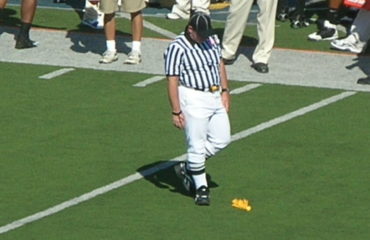 Anyone who’s ever been on a schedule of wall-to-wall meetings knows how after a while it all becomes some kind of crazy blur – how at some point, they all start to run together in your mind, and how easy it can be to confuse the things discussed in one with the gist of another. If that sound like a description of your own hectic timetable, I’d like to offer you the benefit of a technique I’ve begun utilizing to keep my own overcrowded calendar free of such disorientation.
Anyone who’s ever been on a schedule of wall-to-wall meetings knows how after a while it all becomes some kind of crazy blur – how at some point, they all start to run together in your mind, and how easy it can be to confuse the things discussed in one with the gist of another. If that sound like a description of your own hectic timetable, I’d like to offer you the benefit of a technique I’ve begun utilizing to keep my own overcrowded calendar free of such disorientation.
Now, don’t get me wrong — I’m not complaining about having too much on my plate. In fact, I consider it a blessing. I never knew how much fun the private equity business could be, particularly when you’re working with a firm like Pegasus Capital Advisors that’s doing great things for people and the planet – which, I believe, accounts for the whirlwind of activity it has involved, especially in waste and recycling, my special areas of expertise.
But, well aware of how easily a steady multi-meeting pace can bring on mental fatigue, I’ve recently discovered a simple way of maintaining focus on the immediate business at hand, no matter how many other such events might be on one’s agenda. In fact, it was on a flight home from Seattle following a week of seemingly nonstop meetings that I realized just how effective it was in recalling the essence of each individual session and the various follow-up strategies that each would entail. It all goes back to one of those “aha” moments, when I first stumbled on the realization that every conference you have with someone or a group of people is actually a “production meeting” in the sense of a theatrical performance or maybe even a Broadway show. By that, I mean that it involves a stage that has been set for the occasion, two or more actors, at least some elements that are scripted, and usually consists of two or three acts.
What led me to this insight was a book I stumbled on a while ago called “Your Brain at Work: Strategies for Overcoming Distraction, Regaining Focus, and Working Smarter All Day Long,” by David Rock, which uses the theater stage as a metaphor to explain consciousness, with thoughts constantly exiting and entering. As the author explains it, the brain “stage” can accommodate no more than four thought “actors” at a time, each playing a different role, and performances lasting no more than about 20 minutes, after which the brain’s prefontal cortex requires a brief ‘intermission’.
As a veteran of countless business meetings, I couldn’t help but see a similarity to those sessions. As a result, I soon began to approach them from a whole new perspective – mentally transforming each into a sort of ‘mini-production’, complete with its own unique setting, script , lighting, props and cast – something I find has not only really helps me focus and pay attention, but is much easier on my brain and body, making me more energetic and focused during a meeting (you might say having more“stage presence”) and better able to recall its significant aspects and outcome.
Prior to using this technique, I found that just as running all the applications on an ipad simultaneously slows down the processing, trying to “multitask” my recollections of a day’s or week’s events could become a difficult proposition. I might, for example, have written a note to myself to follow up a discussion in a particular manner, only to forget the context because I was distracted by intervening events (to say nothing of e-mails and voice mails). But treating each gathering as a whole new performance, uncluttered by props or participants from previous ones, giving my undivided attention to all the other actors and understanding their roles as well as to knowing my own lines, when to deliver them and, for that matter, when to ad lib, has enabled me to give each “act” and ‘scene” my full measure of concentration. The result is that I am able to keep the various aspects of a particular meeting sharp and clear in my mind and distinct from any of the day’s other “productions.”
This approach, I might add, can even be practiced when you are “off stage” – for instance, when you have to be in a different hotel room every night. Instead of just flopping down on the bed and distracting yourself by turning on the TV, try clearing your mind long enough to take in the room, the arrangement of furniture,where the bathroom is and the location of the door and window. It could save you from walking into a wall in the middle of the night – or enable you to exit quickly in the event of a fire. And, in a way, the same applies to business meetings, where your ability to stay sharply focused and “on cue” may spell the difference between a critical success and a flop.



